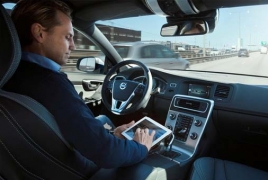Volvo working with NVIDIA to develop self-driving car tech by 2021 June 27, 2017 - 11:19 AMT PanARMENIAN.Net - With virtually every major car manufacturer dumping R&D money into the field, it looks like autonomous vehicles are going to be a thing whether we want them to or not. Early Tuesday morning, June 27, NVIDIA and Volvo announced that they are redoubling their self-driving system efforts by teaming with a number of other companies to develop and distribute a proprietary autonomous AI platform by the start of the next decade, Engadget said. First off, Volvo has gone in halfsies with Autoliv to create a new software development subsidiary called Zenuity. Volvo and NVIDIA have announced that they're teaming up with Zenuity to develop the next generation of self-driving vehicle systems which will be built on NVIDIA's Drive PX AI module. This is the same module that Tesla already uses and which both Audi and Toyota have begun developing on. The system stitches together data from its camera and radar inputs, then compares what it senses to a known high-definition map to automatically plot a safe course around oncoming obstacles. Volvo hopes to have its production vehicles using these self-driving systems available for sale by 2021. NVIDIA also announced that it will be working with ZF and Hella, a pair of big name parts suppliers from Germany that produce vehicular camera and sensor systems, to develop a non-exclusive autonomous steering system. What's more, NVIDIA hopes that integrating additional autonomous safety features like automatic braking will help increase the scores of AI-equipped vehicles taking the DOT's New Car Assessment Program (NCAP) crash test safety certification. This technology will help more than individual drivers. An increasing numbers of vehicles trading data with each other as they travel, why not have them talk to the infrastructure around them as well, Engadget said. "We'll be able to project traffic patterns," Danny Shapiro, Senior Director of Automotive at NVIDIA, said during a recent media briefing call. "We'll be able to protect areas of potential congestion and really work with infrastructure, vehicles and navigation systems to optimize traffic flow and ultimately reduce congestion." "Looking through social media or websites or transit schedules, we'll be able to detect trends and see what's happening in communities and help people plan their journeys," he added. Yerevan will host the 2024 edition of the World Congress On Information Technology (WCIT). Rustam Badasyan said due to the lack of such regulation, the state budget is deprived of VAT revenues. Krisp’s smart noise suppression tech silences ambient sounds and isolates your voice for calls. Gurgen Khachatryan claimed that the "illegalities have been taking place in 2020." Partner news |